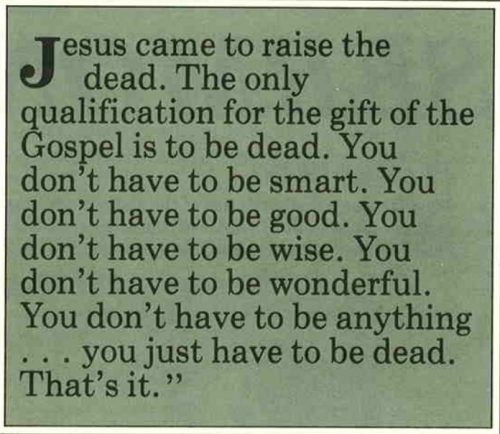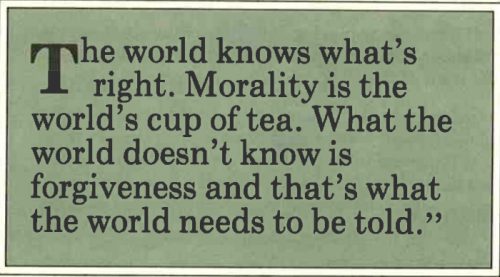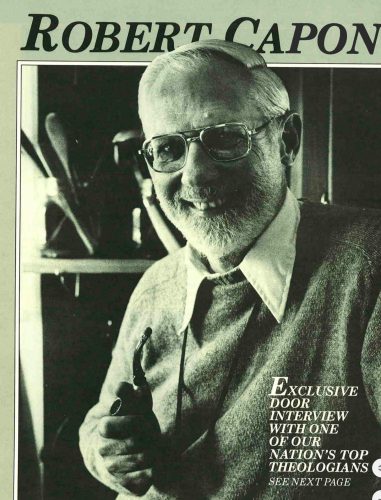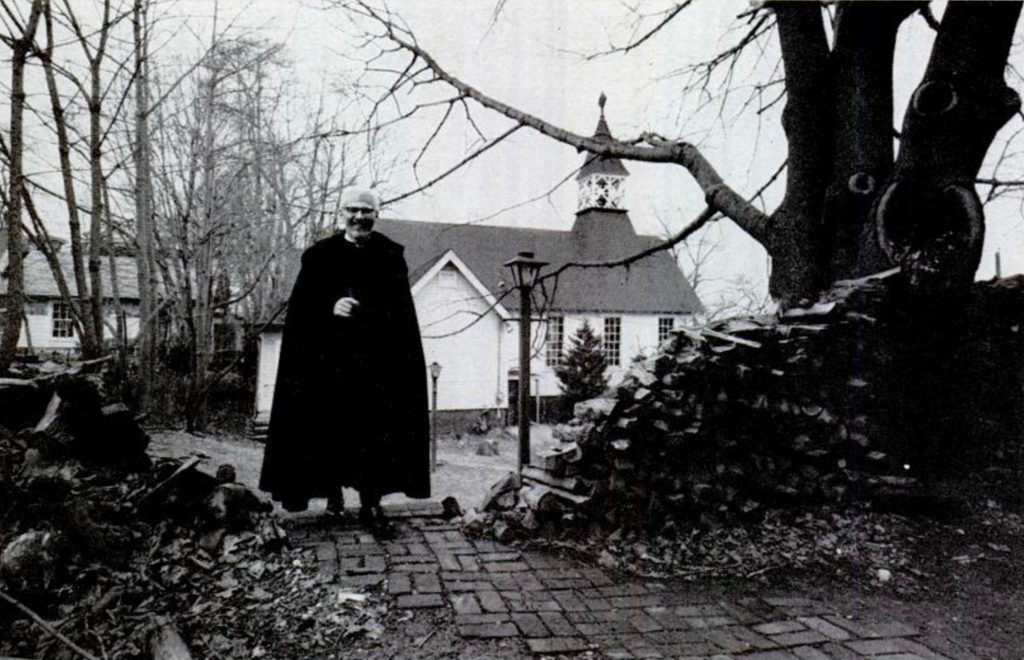
Another gem from The Wittenburg Door, the satirical Christian magazine of yore which brought some heavy-lifting (and light-humored) interviews back in the day. This is their phenomenal interview with hero bon vivant Robert Farrar Capon (ht MM).
Door: You used to teach theology?
Robert Farrar Capon: Someone had to do it.
D: We’re glad it was you and not us.
RFC: So is the theological community.
D: We were going to be easy on you, but now you have forced us to ask the difficult questions. Here’s our first: What is theology?
RFC: That’s a difficult question?
D: Quit stalling.
RFC: Theology is a funny kind of knowledge. Unfortunately, most theologians don’t know that.
D: Most theologians we’ve met are sort of funny.
RFC: Most theologians are too deadpan, too literal, too straightlaced. Theology is not a scientific study in which you say this is “a” and that is “b.” Theology does not deal with concepts, it deals with images.
D: Images?
RFC: The great thing about Scripture is the images it gives you. Scripture delivers us a thousand images or flashlights of different colors and intensities. Scripture is a box full of flashlights and role of theology is to take these flashlights or images and play with them.
D: Play with them?
RFC: Is there an echo in here? My point is that theologians must stay with the images or, rather, the interplay of images, otherwise they end up shrinking the faith down to a system of theology. But the images of Scripture are always very large and demand that you go beyond the limits of your system.
D: We take it you are not a “systematic theologian?”
 RFC: I distrust the idea of systematic theology. I like the name “dogmatic theology,” because at least the word “dogma” has the idea of givenness about it. The only rule in “dogmatic theology” is that you mustn’t sweep any evidence under the rug. In other words, you must never lose a single image. They mystics did this. They said that God is both father and not-father, God is both good and not good. The theologian must not lose any of these images and must work to keep all the images in front of the church so that the mystery is opened as wide as it can.
RFC: I distrust the idea of systematic theology. I like the name “dogmatic theology,” because at least the word “dogma” has the idea of givenness about it. The only rule in “dogmatic theology” is that you mustn’t sweep any evidence under the rug. In other words, you must never lose a single image. They mystics did this. They said that God is both father and not-father, God is both good and not good. The theologian must not lose any of these images and must work to keep all the images in front of the church so that the mystery is opened as wide as it can.
D: Let’s talk about the Gospel a minute. What do you think the average layperson today needs to hear from the Gospel?
RFC: You can judge what people need to hear by what they’re most afraid of hearing. And what people seem to be most afraid of hearing is the notion of unqualified forgiveness–grace. When I preach a sermon on grace I see the people in the congregation smiling and nodding their heads. It is like 200 proof whiskey to people to understand that they are forgiven and loved and the fuss is all over. But by the time the service is over and they arrive at coffee hour, the smiles are gone and the people are full of qualifying questions. People want to hear the Good News but they dread the Good News. I don’t know why they dread it so much but they do. We are afraid of it. We are afraid of really being forgiven and being free. It’s very strange.
D: The subtitle of your book Between Noon and Three says that you are writing about ‘the outrage of grace.’ We must admit, deep inside there is a voice that keeps saying that you can’t allow people to be forgiven without repentance or some kind of cost. Otherwise people will go crazy. They will sin openly without remorse.
RFC: But grace is outrageous. Remember the parable of the laborers in the vineyard?
D: Where everyone gets paid the same, even those who only worked an hour?
RFC: Yes. That is not a parable about labor relations, by the way, it is a parable about goodness. It’s a parable about the fact that there is no proportion between the grace given and the earning of it. All you have to do is be there and you receive grace, the whole day’s pay. That’s outrageous and there is no way to mute it.
But the most outrageous of all parables is the Pharisee and the Publican. The Pharisee says, “I thank God I am not as other men…” He tells God that he is a good man. And he is. There’s no question about it. The Pharisee is the kind of person that every church would be happy to welcome as a member. He tithes. He’s not a womanizer and he honors his contracts. He does everything he’s supposed to do. He is an honest-to-goodness-no-sham-no-fake-good-man. And not only that, he’s coming to thank God for being that way, not thanking himself. Then comes this other bozo. A tax collector who is bleeding his own countrymen dry on a franchise from the Roman government. He’s been skimming the cream of the people’s milk money for years. Outside is his Cadillac, with a case of Chivas Regal in the back and two whores in the front. He looks at his shoe tips and says, “God be merciful to me a sinner.” And Jesus announces that this man goes down to his house justified rather than the Pharisee. Why? The other man is a good man. It is not because the Publican is humble. That is a cheap interpretation. The Pharisee has religion and Jesus is trying to point to the futility of religion. He is trying to point out that no one is bound to God because they have a series of chips that can be traded to God or a deck of cards that can be dealt to God because God says, “Look, don’t play with me because you haven’t got a full deck. There’s a free drink on the house for both of you.” That is the real point. They both have no cards to play with God, but the Pharisee doesn’t know it and the Publican does.
D: But…
RFC: But you don’t like this scenario? Okay. Let’s rewrite the parable a little. Let’s bring the Publican back a week later. Let’s suppose he’s made no change in his behavior. He has continued to skim money from his neighbors. He has continued to drive around with flashy whores and drink high-priced scotch. What do you think God is going to say to him? On what basis can you say that God is going to say anything different this week than he did the week before?
D: Wait a min…
RFC: You still don’t like the scenario? Okay, change it again. Bring the Publican back after one week of reform. Let’s say he has stopped drinking expensive scotch and donated his drinking money to the heart fund. Let’s say he has only one girl instead of two. What do you want God to do with him? Do you want God to look at this Publican and say that he’s a good guy? Why are you so intent on sending the Publican back with the Pharisee’s speech in his pocket?
D: Well, we…
RFC: It’s because you don’t understand the parable. The point is that both the Publican and the Pharisee are invited into the reconciliation with the only difference being that the Publican knew he was dead and said so. Jesus came to raise the dead. The only qualification for the gift of the Gospel is to be dead. You don’t have to be smart.
D: That’s good news for us.
RFC: You don’t have to be good. You don’t have to be wise. You don’t have to be wonderful. You don’t have to be anything…you just have to be dead. That’s it. You see, the whole problem with the Church is that the Church does not want to die. None of us wants to die. But that is the one qualification and that is what is outrageous. There can be only one requirement and it’s got to be low enough to include all of us…and it is. All you have to do is die.
D: You mentioned that the Church does not want to die. What else do you think about the Church?
RFC: The first thing the Church has to realize is that it is not in the religion business; it’s in the Gospel proclaiming business. So often (and it doesn’t matter whether it’s a Catholic notion of the Church or the Protestant notion) the basic impression given is that the Church is kind of a divine panel board that goes through the world with a lot of slots in it and the role of the Church is to persuade people to plug their little jacks into the panel board and they’ll be okay. Depending on the particular ecclesiastical model, you can plug it in sacramentally or plug it in by being born again, etc., but for the Church to give that impression is fatal. It’s fatal because the Church is in the world primarily to announce that God has gathered up every human being’s jack and plugged it into Himself by His death and resurrection.
 D: You are starting to make some conservatives nervous.
D: You are starting to make some conservatives nervous.
RFC: Oh, I know. I always have to apologize for saying what the Gospel says. I have to reassure people that I don’t mean salvation is automatic. If someone is nasty and rotten, they really can go to hell. But that is not the Gospel, that’s the theological tinkering; which is legitimate, but it’s still tinkering. The Good News is that God has done the plugging in for us and what the Church should be doing is running around saying, “Do you realize that He has plugged you in? Would you like to believe that? That’s terrific, isn’t it?”
D: Okay. You’ve forced us to ask you this. Are you a universalist?
RFC: If by universalist you mean that the forgiving grace in Jesus has been universally given to all human beings, yes, I am. You can sing in church, “O Lamb of God, that takes away the sins of the world…except for this list of sins.”
D: It wrecks the music for one thing.
RFC: The point is you can’t do that. Every Christian who believes that the Lamb of God takes away the sins of the world believe that He took them all. But if you ask if the universal gift of forgiveness and grace is refusable by people, then, obviously, yes. Of course. But acceptance of grace is a tricky phrase because in one sense you don’t have to accept it, you’ve got it, but the enjoyment of it and the acceptance of it can be refused. “Oh, taste and see how great is the Lord.” In other words, you’ve got a whole cellar full of it. If you want to sit there and drink Pepsi for the rest of your life with a cellar full of that stuff down there, you can do it. You can go to hell. But that is not the point. The point is you already have the gift.
D: Here’s one of those nagging questions you mentioned earlier, but one can’t help wonder about sin. Doesn’t sin matter? Doesn’t it make a difference?
RFC: Sure it does. It has tremendous consequences. It screws up everything. No one needs to cheer for it. It’s doing very nicely, thank you. It’s winning hands down.
D: We…uh…can see you don’t exactly have a low view of sin, but the point is that if you talk only of forgiveness and unqualified grace, doesn’t that, in effect, give people permission to sin?
 RFC: There are two kinds of people. First there are those who sin boldly. They do exactly what they want to do and wouldn’t think of asking anyone’s permission. Then there are those people who need permission for anything they do, good or bad. Those people will always be shopping for permission and they will find it somewhere…even in the Gospel. But that doesn’t constitute a flaw in the Gospel. It constitutes a flaw in personalities. You can’t soft pedal the proclamation of the Gospel because people like that are around.
RFC: There are two kinds of people. First there are those who sin boldly. They do exactly what they want to do and wouldn’t think of asking anyone’s permission. Then there are those people who need permission for anything they do, good or bad. Those people will always be shopping for permission and they will find it somewhere…even in the Gospel. But that doesn’t constitute a flaw in the Gospel. It constitutes a flaw in personalities. You can’t soft pedal the proclamation of the Gospel because people like that are around.
The point is that God gave permission. The cross itself is God’s answer to that. If you sin, God isn’t going to do anything to you except die for you. He’s not going to bop you on the head; He’s not going to belt you in the chops.
D: This sounds like the Living New Yorker’s Translation…
RFC: It is not the role of the Church to tell people not to sin and to devise lists. The world perfectly knows what sin is. The world knows what morality is. The world knows what’s right. Morality is the world’s cup of tea. What the world doesn’t know is forgiveness and that’s what the world needs to be told. People confuse forgiveness with permission. Forgiveness is what you do with the impermissible. Life is full of the impermissible and that’s what sin is. But God has died for us and He’s going to rise and in the consummation of that mystery He’s going to vanish into thin air and leave an even deeper mystery, leaving behind only the word of forgiveness.

COMMENTS
6 responses to “Throwback Thursday: The 1983 Interview with…Robert Farrar Capon!”
Leave a Reply















Hilarious! thank you.
That’s so beautiful I might cry.
“All you have to be is dead.” love Capon.
I own every copy of The Door. I had forgotten about Capon until after joining a Lutheran church and the pastor continually spouted Capon gems in his sermons. The name rang a bell and I finally recalled that the Door interviewed him. It’s interesting to read this exchange after all these years… after rediscovering the true Gospel minus the “if you do this, God will do this — the conditional gospel. In other words I’m seeing this interview in a very different light. Also, I forgot just how damn funny those dudes at The Door were. I wonder upon whom they would bestow “The Green Weenie” award today? Oh, they would have a ball picking the recipient and a heck of a time choosing. Thanks for this, Mbird. So sad they closed The Door.
[…] Robert Farrar Capon […]
This article was my first encounter with RFC. I was in college and had just subscribed to The Door. After reading this article–and Hunting the Divine Fox–my theology, indeed my whole view of God, changed forever. Thank you, Fr. Capon!